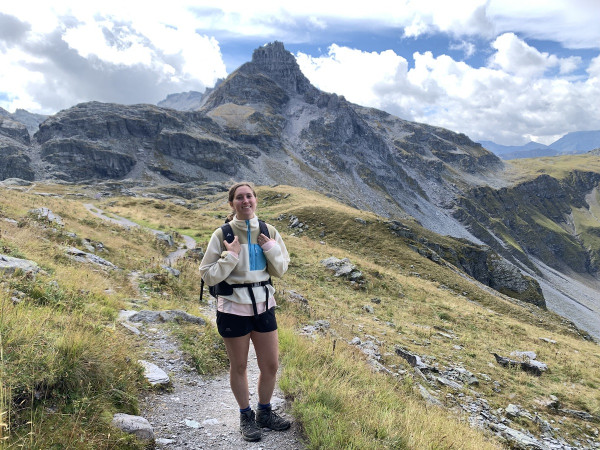Eva Doloszeski
Interview by Nicola Nosengo, NCCR MARVEL in December 2023.
Have you always been interested in science?
I started being interested in it very early, and I was always curious about the physical phenomena I saw around me. Also, my parents are both engineers, and we talked a lot about science. I recall when I was young, we went hiking, and my father asked me questions like, ‘how much work is done to pull a weight up to the top of the mountain?’, and we calculated that while walking. When you have a lot of those scientific discussions with your parents you either love or hate it, and in my case, I loved it. Also, in high school I really enjoyed mathematics and chemistry, and chemistry was always my favorite subject.

Eva Doloszeski
How did you hear about the INSPIRE Potentials Program?
I had done an Erasmus semester at EPFL, where I had attended some of Nicola Marzari’s classes. I was thinking about doing an internship in a research group at EPFL so I had a talk with Clémence Corminboeuf, who told me that my profile fits the requirements of the INSPIRE Potential Program and I should apply. If I hadn’t already been in Switzerland, I may not have had the opportunity.
What is the topic of your master’s project?
We are using a graph neural network fed with data from QM/MM molecular dynamics simulations. With QM/MM, the idea is to get your simulations to a favorable accuracy-to-cost ratio using quantum mechanics for the parts that require higher precision and the molecular mechanics part for the remaining system. In general, however, QM/MM simulations are still quite expensive, and so you can use machine learning to substitute the most computationally demanding parts, for example the QM calculations. In our case we use an equivariant graph neural network, where multipole information is included into the neural network to account for long-range interactions. In my master thesis, I test the entire workflow and investigate a more applied case where I evaluate the ligation state of phosphine ligands to nickel. These ligands can be used as catalysts in cross-coupling reactions which are of great importance in organic chemistry.
Do you think women face specific challenges in the sciences?
I do think that, especially because of an under-representation of women in science. When I was in university studying technical chemistry, we had a decent ratio of men to women. At the time of my bachelor's degree, around 40% of students were women. In other fields of engineering, you rarely exceed 20% of women and as you move up the academic ladder, the number of women decreases even more, from PhD to professor. And that is a big problem because you need role models to encourage girls to go into science. I believe that without a balanced representation of men and women in science, there will always be a bias, which can be seen, for example, in the evaluation of performance.
Any advice for young girls interested in science?
I did a lot of tutoring and I often realized girls have less self-esteem compared to boys, especially if it comes to science or engineering subjects. Again, that is often because there are less girls in scientific classes, so there is this idea that they are less interested in science or not good at it. I would just tell them that there is no reason to believe that. That the reason why there are less girls in those fields is that society is not developed enough, and that women have the same capabilities for logical thinking and creativity and problem solving that are required for science, so they should just go for it.
What are your plans for the future?
I do not really know yet. I really enjoy working with my current research group as you have the opportunity to pursue your own ideas in an open environment with amazing people. I’m leaning towards doing a PhD and staying in academia, but I need to figure that out.
